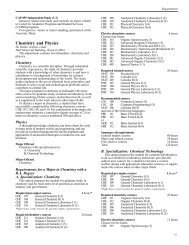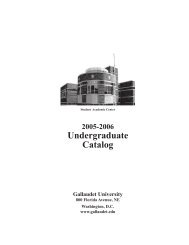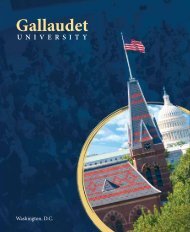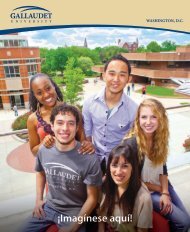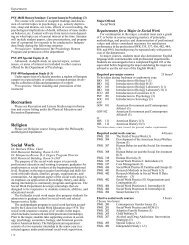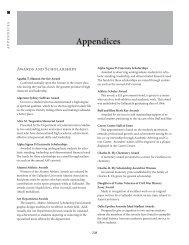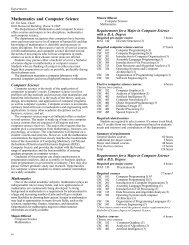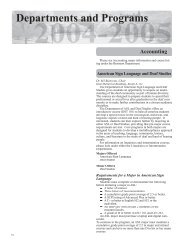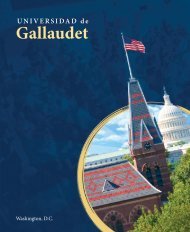Hearing, Speech, and Language Sciences Honors Program
Hearing, Speech, and Language Sciences Honors Program
Hearing, Speech, and Language Sciences Honors Program
You also want an ePaper? Increase the reach of your titles
YUMPU automatically turns print PDFs into web optimized ePapers that Google loves.
Departments<br />
Senior <strong>Honors</strong> Project can prepare students for graduate or<br />
professional-level work.<br />
A B.A. or B.S. degree “with University <strong>Honors</strong>” will be<br />
granted to students with a minimum GPA of 3.4 who complete<br />
the following <strong>Honors</strong> requirements with a grade of B or better:<br />
●<br />
Six credits in <strong>Honors</strong> Seminars.<br />
●<br />
Fifteen credits in <strong>Honors</strong> work from the general<br />
education requirements.<br />
● Nine credits of additional <strong>Honors</strong> work.<br />
●<br />
Participation in an off-campus academic program, such<br />
as the Cooperative Internship <strong>Program</strong> or the consortium.<br />
●<br />
Completion of a Senior <strong>Honors</strong> Thesis or Project.<br />
<strong>Honors</strong> Course Offerings<br />
<strong>Honors</strong> course offerings fall into three categories:<br />
●<br />
<strong>Honors</strong> Sections of general education courses: These<br />
sections, limited to <strong>Honors</strong> students, meet general<br />
education requirements or elective requirements.<br />
Sometimes linked, they are more dem<strong>and</strong>ing than<br />
regular sections in terms of content <strong>and</strong> performance<br />
required.<br />
●<br />
<strong>Honors</strong> Option (H-option): <strong>Honors</strong> students may earn<br />
<strong>Honors</strong> credit for a regular course by contracting with<br />
the instructor (with approval of the <strong>Honors</strong> Director)<br />
to complete more challenging <strong>and</strong> indepth work than in<br />
the regular course.<br />
●<br />
<strong>Honors</strong> Seminars: These courses provide an interdisci<br />
plinary approach to topics. Each student will complete<br />
a research project. Guest lecturers <strong>and</strong> off-campus<br />
excursions are common features of the seminars.<br />
Topics vary.<br />
<strong>Honors</strong> <strong>Program</strong> Courses Offered<br />
HON 300 <strong>Honors</strong> Seminar (2-3)<br />
An interdisciplinary study of a given topic. The topic will<br />
be examined from the viewpoint of a variety of academic<br />
disciplines. Through readings <strong>and</strong> discussions, students<br />
investigate various aspects of an issue. Although one<br />
professor will coordinate the course, there will be frequent<br />
guest lecturers <strong>and</strong> field trips where appropriate. Topics vary<br />
each semester.<br />
Prerequisite: Admission to the University <strong>Honors</strong> <strong>Program</strong>,<br />
or special permission of the instructor <strong>and</strong> <strong>Honors</strong> director.<br />
Additional prerequisites may be required for given topics.<br />
HON 487 Preparation for Senior <strong>Honors</strong> Project (2)<br />
Intensive development of an approved idea for a project<br />
conducted under the supervision of a project director. While<br />
the prime example of a project is a thesis, other projects<br />
include a creative work, technical innovation, or other work<br />
of originality, depth, <strong>and</strong> rigor that prepares the student for<br />
graduate or professional work. Successful completion of the<br />
course requires submission of a project proposal acceptable to<br />
the project director, a second advisor, <strong>and</strong> the <strong>Honors</strong> Council.<br />
May count toward requirements for the major with permission of<br />
the department.<br />
Prerequisites: Good st<strong>and</strong>ing in the University <strong>Honors</strong><br />
<strong>Program</strong>, junior/senior status, permission of appropriate<br />
department(s), <strong>and</strong> permission of the <strong>Honors</strong> Council.<br />
HON 488 Senior <strong>Honors</strong> Project (4)<br />
Completion of project proposed in HON 487. Modification<br />
of the project may be made with the consent of the project<br />
director, a second advisor, <strong>and</strong> the <strong>Honors</strong> Council. Successful<br />
completion of the course requires approval by the <strong>Honors</strong><br />
Council, the project director, <strong>and</strong> a second advisor. May<br />
count toward requirements for the major with permission of<br />
the department.<br />
Prerequisites: Good st<strong>and</strong>ing in the University <strong>Honors</strong><br />
<strong>Program</strong>, senior status, permission of appropriate departments,<br />
permission of the <strong>Honors</strong> Council, <strong>and</strong> successful<br />
completion of HON 487.<br />
HON 495 Special Topics (1-3)<br />
In-depth study on special topics, current issues, or areas<br />
of interest not included in other courses <strong>and</strong> not necessarily<br />
interdisciplinary as <strong>Honors</strong> Seminars are.<br />
Prerequisites: Permission of the <strong>Honors</strong> Director. Additional<br />
prerequisites may be required for given topics.<br />
HON 499 Independent Study (1-3)<br />
Intensive supervised study <strong>and</strong> research on topics of the<br />
student’s selection.<br />
Prerequisites: Permission of the <strong>Honors</strong> Director. Additional<br />
prerequisites may be required for given topics.<br />
Interpretation<br />
Dr. Valerie L. Dively, Chair<br />
Dawes House<br />
The Department of Interpretation prepares interpreters to<br />
interact <strong>and</strong> communicate fluently with deaf, hard of hearing,<br />
<strong>and</strong> hearing people, with an appreciation of diversity in deaf<br />
<strong>and</strong> hearing communities.<br />
Interpretation Courses Offered<br />
ITP 660 Practical Skills for Interpreter Educators (1)<br />
This course is designed for interpreter educators who<br />
would like to develop or enhance their skills in teaching<br />
interpreting. Basic approaches to learning theory will be<br />
introduced. The emphasis of this course is on development<br />
of specific skills used in teaching the cognitive tasks<br />
associated with interpreting <strong>and</strong> the evaluation of those<br />
skills. This course is not included in the major.<br />
ITP 661 ASL Intralingual Skills for Interpreters (1)<br />
This course is designed for interpreters or future interpreters<br />
who would like to develop their American Sign <strong>Language</strong><br />
(ASL) skills. Underst<strong>and</strong>ing the source message when it is in<br />
ASL is a crucial skill often overlooked in interpreter education.<br />
The exercises deal with ASL only. Topics include finding<br />
the main point, abstracting, prediction skills, finding key<br />
signs, rephrasing, <strong>and</strong> text analysis. Also included will be<br />
exercises on simple <strong>and</strong> complex ASL utterances. This course<br />
is not included in the major.<br />
Prerequisite: Good comm<strong>and</strong> of ASL<br />
ITP 695 Special Topics (1-3)<br />
Italian<br />
Please see Italian course listing under the Foreign <strong>Language</strong>s,<br />
Literatures, <strong>and</strong> Cultures Department.<br />
Latin<br />
Please see Latin course listing under the Foreign <strong>Language</strong>s,<br />
Literatures, <strong>and</strong> Cultures Department.<br />
94



